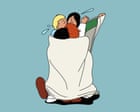Peter Sarsgaard’s calm authority has brought depth to a huge range of roles, from Dopesick to Batman. He talks about his dismay at Trump’s victory, trying to do the right thing, and raising his daughters with Maggie Gyllenhaal
Peter Sarsgaard appears on Zoom as he often does on film: quiet, soft-spoken, gentle poise concealing grave thoughts within. Now 53, he has been an actor for three decades, a star of independent films and big-money Hollywood productions in which he tends to depict men with ulterior motives – men who are not what they seem at first. As we talk online, he is sitting in the offices of Paramount Pictures, in New York, appearing chill – dark suit, white shirt open at the collar, silver rings in each ear – only to suddenly cackle pleasantly at a dark thought. “Face-value people are pretty tough,” he says, of character parts he prefers to turn down. “Like, straightforward.” He pauses. “Sincerity is difficult to play.”
Sarsgaard will soon appear in September 5, a film that recounts the 1972 Munich massacre, during which members of the Israeli Olympic team were taken hostage by Palestinian terrorists, as broadcast by an ABC sports crew who covered the episode live. Sarsgaard plays Roone Arledge, a brusque ABC executive. Much of his time on screen involves battling with higher-ups in order to maintain his team’s access to a story he believes, for better or worse, is a must-watch. As events progress, new questions of morality arise: if a hostage is executed and the moment captured in real time, should the footage be broadcast? In what ways does the live coverage of graphic brutality benefit viewers? In fact, for much of the ABC broadcast “nothing really happens,” Sarsgaard says. Cameras fix on a news anchor, stationed in a Munich studio, who is required to share and re-share scraps of incomplete information. The real tragedy unfolds out of sight.



















